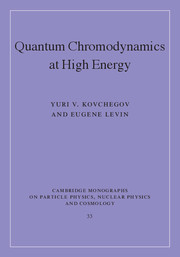Book contents
- Frontmatter
- Contents
- Preface
- 1 Introduction: basics of QCD perturbation theory
- 2 Deep inelastic scattering
- 3 Energy evolution and leading logarithm-1/x approximation in QCD
- 4 Dipole approach to high parton density QCD
- 5 Classical gluon fields and the color glass condensate
- 6 Corrections to nonlinear evolution equations
- 7 Diffraction at high energy
- 8 Particle production in high energy QCD
- 9 Instead of conclusions
- Appendix A Reference formulas
- Appendix B Dispersion relations, analyticity, and unitarity of the scattering amplitude
- References
- Index
9 - Instead of conclusions
- Frontmatter
- Contents
- Preface
- 1 Introduction: basics of QCD perturbation theory
- 2 Deep inelastic scattering
- 3 Energy evolution and leading logarithm-1/x approximation in QCD
- 4 Dipole approach to high parton density QCD
- 5 Classical gluon fields and the color glass condensate
- 6 Corrections to nonlinear evolution equations
- 7 Diffraction at high energy
- 8 Particle production in high energy QCD
- 9 Instead of conclusions
- Appendix A Reference formulas
- Appendix B Dispersion relations, analyticity, and unitarity of the scattering amplitude
- References
- Index
Summary
The research on saturation/CGC physics is ongoing, with a number of open theoretical and phenomenological questions. Therefore, instead of conclusions, in this chapter we briefly review the phenomenology of saturation/CGC physics and list some important open theoretical problems.
Comparison with experimental data
In this section we will give a brief overview of how high energy QCD theory compares with the current experimental data. The reader may wonder whether such a comparison is possible to fit into one short section; indeed, a comparison of saturation/CGC physics with experiment could be a subject for a separate book. However, a serious quantitative comparison with experiment suffers from two major difficulties. The first is that a welldeveloped theoretical approach exists only for the scattering of a dilute parton system on a dense one; the key examples are DIS on nuclei (eA) and the proton-nucleus (pA) collisions considered earlier. At the same time, much of the data exist either for the scattering of a dense parton system on another dense parton system, as is the case in nucleus–nucleus (AA) collisions, or for the scattering of two dilute systems on each other, like DIS on a proton (ep) or proton-proton (pp) collisions. The theoretical progress in the description of these reactions in the saturation/CGC framework is rather limited, with many open questions and opportunities for further research (see Sec. 8.3 for a brief summary of the existing AA results).
- Type
- Chapter
- Information
- Quantum Chromodynamics at High Energy , pp. 293 - 306Publisher: Cambridge University PressPrint publication year: 2012



